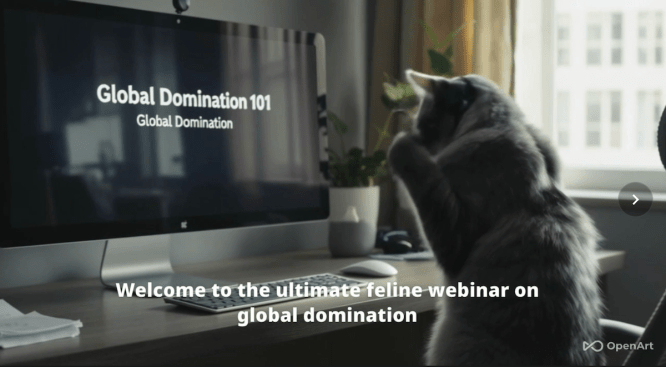AI-generated “brain rot” videos are gaining popularity across the internet, especially among younger audiences. These clips often feature bizarre characters, such as a shark wearing sneakers or a ballerina with a cappuccino for a head.
One startup fueling this trend is OpenArt, founded in 2022 by two former Google employees. The company claims around 3 million monthly active users and recently introduced a new “one-click story” feature in open beta. This tool allows users to input a single sentence, script, or song and transform it into a one-minute video with a structured narrative. The feature can generate anything from lighthearted TikTok content to explainer videos or music videos for YouTube, with potential applications in advertising.
Users can choose from three templates: Character Vlog, Music Video, or Explainer. For character vlogs, they upload an image of their character and enter a prompt. If a song is uploaded, the software interprets the lyrics and creates animations that match the themes, such as flowers blooming in a garden.
The platform includes an editor for refining individual clips by adjusting prompts in storyboard mode. It integrates over 50 AI models, including DALLE-3, GPT, Imagen, Flux Kontext, and Stable Diffusion, giving users flexibility in their creative process.
OpenArt aims to make AI content creation more accessible, but ethical concerns remain. Issues like imitating artists’ styles, intellectual property rights, and the potential for misuse and misinformation persist.
During testing, the Character Vlog option raised legal concerns due to its inclusion of copyrighted characters like Pikachu, SpongeBob, and Super Mario, which could lead to IP infringement risks. Earlier this year, Disney and Universal sued AI firm Midjourney over AI-generated images. Users should be aware that copyright violations could result in content removal or legal action.
Coco Mao, OpenArt’s co-founder and CEO, stated that the company takes IP infringement seriously. While their models typically reject copyrighted characters, occasional slip-ups occur. OpenArt is open to discussions with major IP holders for licensing agreements.
A key differentiator for OpenArt is its focus on character consistency. Unlike other video models that produce disjointed clips, OpenArt ensures visual and narrative coherence, making stories more immersive.
Future updates may include multi-character conversations and a mobile app. The platform operates on a credit-based pricing system, with plans ranging from $14 to $56 per month.
OpenArt has secured $5 million in funding from Basis Set Ventures and DCM Ventures and reports positive cash flow. The company is on track to exceed $20 million in annual revenue.

